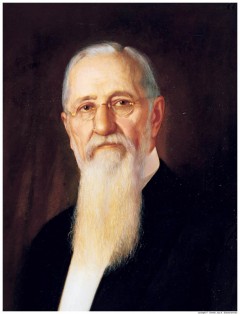In the spring of 1848, as the Presidency and all who were able were leaving Winter Quarters for the Valley, my mother made an attempt to go along. During the fall and winter she had made two trips down into Missouri to purchase provisions and trade for “necessities” for the family, which numbered in all, about eleven.
 Once I accompanied her, along with my uncle Joseph Fielding, at which time we went to St. Joseph, Missouri, and purchased corn and had it ground at Savannah, and on our way home we camped in the edge of a wood, in the neighborhood of a large herd of cattle that were being driven to market. In the morning our best yoke of cattle were gone. My uncle and I hunted far and near but could not find them. We enquired of the herdsmen and followed their directions but could not find our oxen. This broke up our team so that we could not travel and would have been under the necessity of purchasing or trading in some way for another yoke before we could have moved on.
Once I accompanied her, along with my uncle Joseph Fielding, at which time we went to St. Joseph, Missouri, and purchased corn and had it ground at Savannah, and on our way home we camped in the edge of a wood, in the neighborhood of a large herd of cattle that were being driven to market. In the morning our best yoke of cattle were gone. My uncle and I hunted far and near but could not find them. We enquired of the herdsmen and followed their directions but could not find our oxen. This broke up our team so that we could not travel and would have been under the necessity of purchasing or trading in some way for another yoke before we could have moved on.
But after some delay, and Mother had cleared up after breakfast, she started out to find the cattle. Uncle thought it was useless for her to go. I confess I thought so too, but I had more faith that she would find them, if findable, than I had in either my or my uncle’s finding them. While Mother was walking along through the tall grass, one of the herdsmen rode up to her and said he had seen her cattle over in the opposite direction to what she was going. Strange to say she passed right on, not heeding what had been said at all. He repeated, she paid no attention but passed on as tho’ she were “in the strait and narrow path.” Suddenly she came upon a slight ravine filled with tall willows, and in a dense cluster of large willows she found the oxen, where they had been fastened up during the night by the herdsmen with the intention of stealing them and driving them to the market, for they were in good condition. After the cattle were found, these worthy herdsmen suddenly rode off, perhaps in search of honesty, which I trust they found.
We moved on smoothly until we reached a point about midway between the Platte and Sweetwater Rivers. One of our best oxen lay down in the yoke as if poisoned, and all supposed he would die. Captain Lott now blustered about, as if the world was about at an end. “There,” he said. “I told you you would have to be helped, and that you would be a burden on the company.” But in this he was mistaken, for after praying for the ox and pouring oil upon him, he got up and we drove along, only detaining the company a very short time.
We had not gone far when another fell down like the first. But with the same treatment he got up as the other. I believe this was repeated the third time, to the astonishment of all who saw and the chagrin of Captain Lott.
My team leaders’ names were Thom and Joe—we raised them from calves, and they were both white. Thom was trim built, active, young, and more intelligent than many a man. Many times while traveling sandy or rough roads, on long, thirsty drives, my oxen were lowing with the heat and fatigue. I would put my arms around Thom’s neck and cry bitter tears! That was all I could do. Thom was my favorite and best and most willing and obedient servant and friend. He was choice!
Account quoted from I Walked to Zion by Susan Arrington Madsen. 1994. p36–37.
Joseph F. Smith became the sixth President of the Church of Jesus Christ of Latter-day Saints.
Twitter •


 Watch a video about the restoration of the gospel on lds.org
Watch a video about the restoration of the gospel on lds.org
Trackbacks/Pingbacks